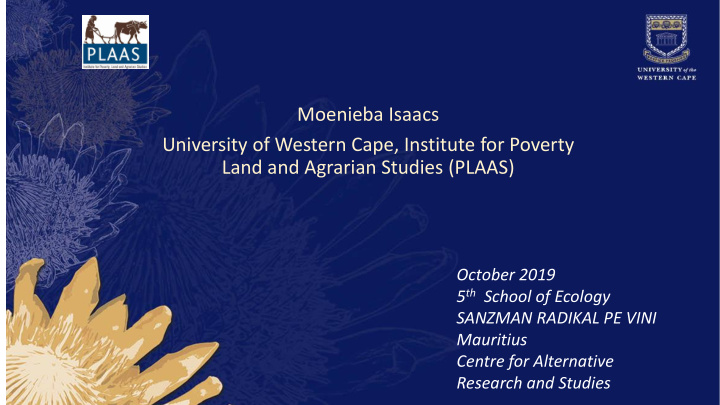



Moenieba Isaacs University of Western Cape, Institute for Poverty Land and Agrarian Studies (PLAAS) October 2019 5 th School of Ecology SANZMAN RADIKAL PE VINI Mauritius Centre for Alternative Research and Studies
The Snoek trade with Mauritius • From early 1800s the major market for Cape snoek, was Mauritius. • This market was created by the large number of labourers on the sugar plantations of Mauritius, and Cape snoek was a relatively inexpensive way of feeding the workers. • A small coastal town Kalk Bay – dried, salted snoek and their small vessels were used to export the snoek to larger vessel where it was then shipped to Mauritius.
The Snoek trade with Mauritius • This trade continued for many years but from approximately 1885 the trade of dried fish to Mauritius had all but disappeared. • With the drop in price of sugar – snoek became too expensive and cheaper supplies of fish for the workers on the sugar plantations. • At Kalk Bay the fishermen now turned their attention to supplying the local market. • By 1892, Kalk Bay became the principle supplier of fish in the Colony.
The Snoek trade with Mauritius • By 1930 large amounts of salted snoek were, once again being exported to Mauritius, yet the fishermen were still faced with the problem of selling to the local market. • According to them, the hawkers were agreeing on the prices they would pay to the boats when they returned from the fishing grounds. They then re-sold the fish to the public at exorbitant prices.
Snoek Snoek is an important food protein source, rich in Omega 3 and 6 oils, “nothing goes to waste”
Snoek Value Chain “ Langana ” / Fish Trader Cash is “king”, Purchasing, Consumption, informal credit Crew/Skipper Food Use, Quality and advances to Catch distribution Sanitation, New Zealand consumers, value “ gazat ” system Baracouta adding (smoke, air Input costs dried)
Fishers
Market
Gender dynamics
10
In South Africa, the fishing 65 jobs for 1000 metric industry is all tons of hake about hake 155 000 metric tons allocate to the hake sector = 10075 jobs 12.26% 32.36% 31% 3.46% 13.82% 11
Environmental Crisis Jobs Crisis Overfishing Fuel Prices Social and economic indicators Mechanization Seasonal originally developed by Thomson in Closure of factories 1980 (Pauly, 2006, FAO 2012) to Mergers Price fixing show how national and international fisheries policies tend to favour the large-scale sector through fuel subsidies and investments, while small-scale fisheries remain undervalued, data on them is often not reported, and they are often ignored in their contribution to food and nutrition security.
Key narratives Job crisis Fish as food & nutrition, Environmental crisis livelihoods, culture, traditions, religion, Human rights practice, learnings, meanings, Key Themes Fisheries Policies, Rights Allocations, Transformation Large-scale, Mechanization Aquaculture, Small-scale, Informal Value-chain, Poaching, Gender, Ocean grabbing, coastal grabbing, land grabbing, blue justice…
a day of Protest against the lack of water, sanitation, housing, fishing rights, abalone farms, and the poachers from taking abalone for the day…
Colombia
400 years commemoration of slavery from Africa • As Europeans began to explore the world, early claims were focused on securing the seas for transport, facilitating the accumulation of wealth. • These powers were felt most starkly in West Africa with the rapid growth of the trans-Atlantic slave trade, connecting the region to the Americas through the supply of 'free' labor, and fueling economic growth in Europe. • Atlantic Ocean acts as "an unmarked grave site" for slaves lost or thrown overboard (Deloughrey 2017: 35). • History is intertwined with capital (Walcott 1987). • A site of ongoing capital accumulation (Baucom 2005) • the right of access to all seas, and technological breakthroughs in innovations in shipping and transport, enabled European domination of the world economy (Hugill 1993). 22
Political Political ecology economy BLUE JUSTICE Ocean, coastal, human land Social justice rights grabbing …
Groupwork (Beinstein and Borras) 1. Who has the right? 2. To what resources? 3. For what purpose? 4. For how long? 5. Who gets to decide?
Recommend
More recommend